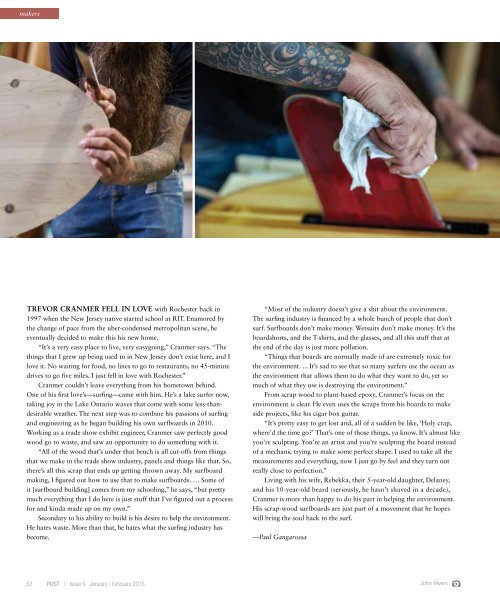Create successful ePaper yourself
Turn your PDF publications into a flip-book with our unique Google optimized e-Paper software.
makers<br />
Trevor Cranmer fell in love with Rochester back in<br />
1997 when the New Jersey native started school at RIT. Enamored by<br />
the change of pace from the uber-condensed metropolitan scene, he<br />
eventually decided to make this his new home.<br />
“It’s a very easy place to live, very easygoing,” Cranmer says. “The<br />
things that I grew up being used to in New Jersey don’t exist here, and I<br />
love it. No waiting for food, no lines to go to restaurants, no 45-minute<br />
drives to go five miles. I just fell in love with Rochester.”<br />
Cranmer couldn’t leave everything from his hometown behind.<br />
One of his first love’s—surfing—came with him. He’s a lake surfer now,<br />
taking joy in the Lake Ontario waves that come with some less-thandesirable<br />
weather. The next step was to combine his passions of surfing<br />
and engineering as he began building his own surfboards in 2010.<br />
Working as a trade show exhibit engineer, Cranmer saw perfectly good<br />
wood go to waste, and saw an opportunity to do something with it.<br />
“All of the wood that’s under that bench is all cut-offs from things<br />
that we make in the trade show industry, panels and things like that. So,<br />
there’s all this scrap that ends up getting thrown away. My surfboard<br />
making, I figured out how to use that to make surfboards. … Some of<br />
it [surfboard building] comes from my schooling,” he says, “but pretty<br />
much everything that I do here is just stuff that I’ve figured out a process<br />
for and kinda made up on my own.”<br />
Secondary to his ability to build is his desire to help the environment.<br />
He hates waste. More than that, he hates what the surfing industry has<br />
become.<br />
“Most of the industry doesn’t give a shit about the environment.<br />
The surfing industry is financed by a whole bunch of people that don’t<br />
surf. Surfboards don’t make money. Wetsuits don’t make money. It’s the<br />
boardshorts, and the T-shirts, and the glasses, and all this stuff that at<br />
the end of the day is just more pollution.<br />
“Things that boards are normally made of are extremely toxic for<br />
the environment. ... It’s sad to see that so many surfers use the ocean as<br />
the environment that allows them to do what they want to do, yet so<br />
much of what they use is destroying the environment.”<br />
From scrap wood to plant-based epoxy, Cranmer’s focus on the<br />
environment is clear. He even uses the scraps from his boards to make<br />
side projects, like his cigar box guitar.<br />
“It’s pretty easy to get lost and, all of a sudden be like, ‘Holy crap,<br />
where’d the time go?’ That’s one of those things, ya know. It’s almost like<br />
you’re sculpting. You’re an artist and you’re sculpting the board instead<br />
of a mechanic trying to make some perfect shape. I used to take all the<br />
measurements and everything, now I just go by feel and they turn out<br />
really close to perfection.”<br />
Living with his wife, Rebekka, their 5-year-old daughter, Delaney,<br />
and his 10-year-old beard (seriously, he hasn’t shaved in a decade),<br />
Cranmer is more than happy to do his part in helping the environment.<br />
His scrap-wood surfboards are just part of a movement that he hopes<br />
will bring the soul back to the surf.<br />
—Paul Gangarossa<br />
52 <strong>POST</strong> | Issue 9 <strong>January</strong> / <strong>February</strong> <strong>2015</strong><br />
John Myers


